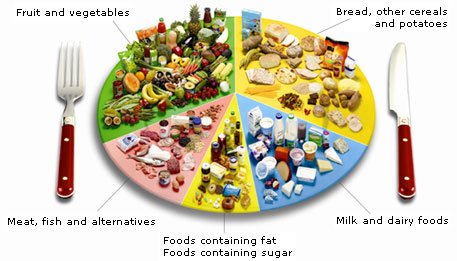
Make sure you and your body are happy with the dieting approach. (Getty Images)
A healthy diet doesn’t require a lot of money or newfangled appliances or subsisting on any kind of scheme that sounds like a gimmick. Because it’s true what they say about what seems too good to be true: Eating well means listening to that little voice inside that knows what healthy foods generally look like – fresh and recognizable in nature – and what they don’t – prepackaged and processed.
That sensibility may not fit so well with our on-demand culture, where we want results now – be it dinner or weight loss. But if you want a program that works for the long run, you’ll need a lifestyle you can live with and like. That means a diet that’s nutritious and delicious, but one that will take a bit of planning and commitment from you.
While staying lean is a big part of good health, weight lost doesn’t always equal health gained. That new diet that took inches off your waistline could be harming your health if it locks out or severely restricts entire food groups, relies on supplements with little scientific backing or clamps down on calories to an extreme.
[See: 6 Ways to Train Your Brain for Healthy Eating.]
“People are so desperate to lose weight that it’s really weight loss at any cost,” says Madelyn Fernstrom, founding director of the University of Pittsburgh Medical Center Weight Management Center. And when that desperation sets in, Fernstrom says, “normal thinking goes out the window.” Who cares how wacky or unhealthy a recommendation sounds to you? Pounds are coming off. You’re happy. But your body might not be. And that approach always guarantees weight regain.
With our Best Diets 2018 rankings, you can check the nutritional completeness and safety of 40 popular diets, from Atkins to the Fertility Diet to Weight Watchers, in a detailed profile crafted for each one. (The profiles also cover scientific evidence, typical meals and much more.) And U.S. News’ Best Diets for Healthy Eating rankings give each diet a “healthiness” score from 5 (best) to 1 (worst) for safety and nutrition, with safety getting double weight; while you can modify a diet to some degree to adjust for nutritional imbalances or deficiencies, mere tweaking won’t make an unsafe diet safe.
Behind these scores are ratings by a panel of diet and nutrition experts assembled by U.S. News. They assessed the diets across seven categories, including the safety and nutritional completeness categories, for a series of nine different rankings lists. The Best Diets for Healthy Eating rankings overlap significantly with Best Diets Overall. Both give especially high marks to the DASH, MIND, TLC, Mediterranean, Mayo Clinic and Volumetrics diets.
[See: 7 Reasons to Choose a Plant-Based Diet.]
“The ones that get high scores in safety and in nutritional value – they’re very similar to each other,” says Andrea Giancoli, a registered dietitian who serves on the U.S. News expert panel. The recurring theme across the diets that excelled in healthiness is adequate calories supplied by a heavy load of vegetables, fruits and whole grains; a modest amount of lean protein, nonfat dairy and healthy fats; and an occasional treat. Plants are the foundation, and the menu is always built around minimally processed meals made from scratch.
Because plant-based eating patterns are so healthful and growing in popularity, U.S. News also offers a Best Plant-Based Diets category. And given the rise of food intolerances and sensitivities, we’ve included profiles of diets that are said to ease digestive distress – the gluten-free and low FODMAP diets. These are not ranked, however, as they are not intended for general dietary needs.
Very few diets on the Healthy Eating list are overtly unsafe or severely deficient nutritionally. Twelve plans received healthiness scores below 3; these included the Paleo, Raw Food, Fast, Dukan, Atkins and Whole30 diets. They’re simply too restrictive, say our experts, who call their nutritional qualities into question. The meat-heavy Paleo diet bans grains and dairy, so getting adequate calcium and vitamin D isn’t easy. Atkins, by severely curbing carbs, blows past recommended caps for total and saturated fat. Depending on your personal approach to the Raw Food Diet, you may shortchange yourself on calcium, vitamin B12 and vitamin D; its restrictive cooking rules also could put you at risk for eating raw or undercooked ingredients.
[See: High-Protein Breakfast Ideas.]
If you have reservations about a diet’s nutritional content or safety, listen to your body. Fatigue, sleeplessness, dizziness, aches – they’re all red flags. Says Fernstrom: “Losing weight is for good health, so you should feel more vital – not bad.”
Best Diets for Healthy Eating
| Rank | Diet Name |
|---|---|
 #1 #1 |
DASH Diet |
 #1 #1 |
Mediterranean Diet |
 #3 #3 |
The Flexitarian Diet |
 #3 #3 |
TLC Diet |
 #5 #5 |
Mayo Clinic Diet |
 #5 #5 |
MIND Diet |
 #5 #5 |
Volumetrics Diet |
 #5 #5 |
Weight Watchers Diet |
 #9 #9 |
The Fertility Diet |
 #9 #9 |
Ornish Diet |
 #9 #9 |
The Traditional Asian Diet |
Diet Ranking information as of January 3rd, 2018
Updated on Jan. 3, 2018: This is an updated version of a previously published story.
